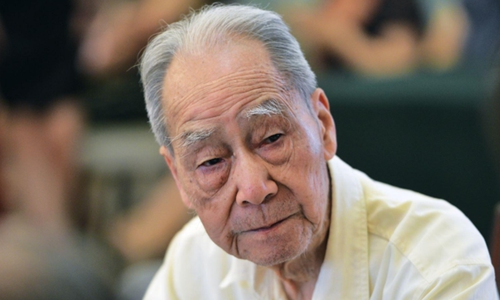
Xu Yuanchong
Distinguished Chinese translator Xu Yuanchong passed away on Thursday. He was 100.
Xu was also a professor at Peking University known for his countless translation works of ancient Chinese poetry and many English and French literary works.
Xu began his translating career in the 1930s and made enormous contributions to introducing foreign literature to China and ancient Chinese poetry to the world.
Known as "the only master in China who can translate classical Chinese poetry, English and French verse," Xu translated over 120 publications in Chinese, English, and French, and won the Chinese Translation Culture Lifetime Achievement Award in December 2010. He also won the Aurora Borealis Prize for Outstanding Translation of Literature in 2014 at the age of 93, making him the first person in Asia to win the prize.
He has translated famous French masterpieces including
Madame Bovary,
The Red and the Black, and
Remembrance of Things Past into Chinese, and introduced to the world countless ancient poems of the Tang Dynasty (618-907) and Song Dynasty (960-1279), and
The Book of Songs, the country's earliest collection of poetry, by translating them into English.
"They like uniforms, not the gay dresses," according to a well-known poem from late Chinese leader Mao Zedong, which depicted a military training picture of female soldiers at the time.
However, Xu introduced his unique way of translating the sentence, which goes as "Most Chinese daughters have a desire strong, they like to face the power, not to powder the face." It has become one of the most quoted translations as netizens pay tribute to this legend.
Xu tried his hand at translation in college, when he quoted "of the people, by the people, for the people" from Abraham Lincoln's Gettysburg Address to explain Sun Yat-sen's Three Principles of the People to foreigners. Sun was the founder of the Kuomintang Party, and is a revered revolutionary leader who played a pivotal role in overthrowing imperial rule in China.
In school, Xu was called one of the "five talents" at the National Southwest Associated University (1937-45) - a school whose history and graduates have played a central role in modern China. Xu recalled in a talk show on CCTV in 2017 his friendship with his schoolmate, Chinese physicist and Nobel laureate Yang Chen-Ning, and his teacher, the late literature master Qian Zhongshu.
At an age of 100, he still stayed in a small room to do Shakespeare translations almost every day. It was more like a pleasure instead of work to describe translation for him.
The news of his death has been trending on Sina Weibo, with numerous netizens paying tribute to him.
"I was astonished and am saddened by the news today. Professor Xu was quite a lovable and sincere person," Cui Meng, a student at the School of Journalism and Communication of Peking University, told the Global Times on Thursday.
Cui told the Global Times that he attended Xu's 100th birthday party months ago where he had a chance to talk to Xu in person. "He had bad hearing so he always tilted toward me and listened carefully when I spoke to him," added Cui.
"I was so lucky that I once met Professor Xu. He was always energetic and full of passion when talking about translations and poetry," said one netizen who posted photos of them together on Weibo.
From hill to hill no bird in flight;
From path to path no man in sight.
A lonely fisherman a float,
Is fishing snow in lonely boat.
----
River Snow, a poem in Tang Dynasty ((618-907 AD) translated by Xu in 1988
Love once began will never end.
The lovers may die for love,
in China the dead in love may revive.
----Xu's translation of
The Peony Pavilion, a masterpiece by Chinese playwright Tang Xianzu (1550-1616) from the Ming Dynasty (1368-1644)




